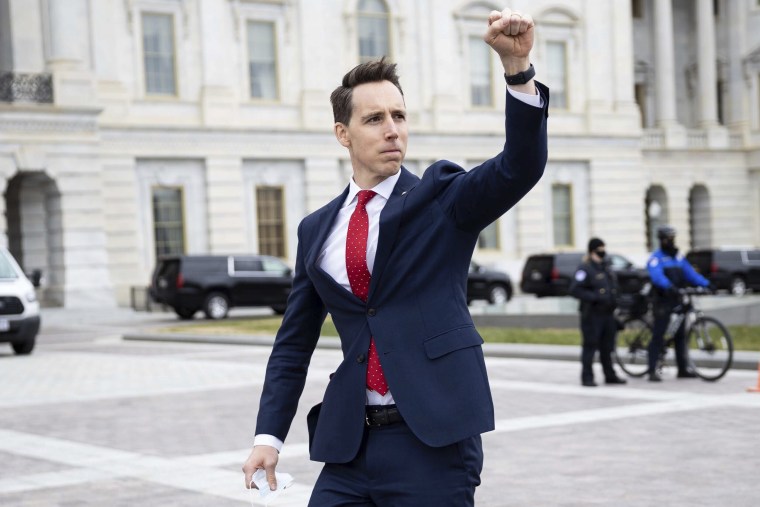WASHINGTON — One of his most important early backers now says supporting him "was the worst mistake I ever made in my life," and a top donor called for him to be censured by the Senate.
That's just some of the condemnation that's come Sen. Josh Hawley's way since the Missouri Republican became the first senator to announce he would object to the counting of Electoral College votes and then moved forward with his plan even after a mob of President Donald Trump's supporters had stormed the Capitol on Wednesday.
The largest newspapers in his home state called on him to resign. His publisher canceled its contract with him for an upcoming book. He's been pilloried by both Democrats and Republicans for leading the futile objection effort.
And a viral photo of Hawley entering the Capitol before the riot, showing the senator in a slim-fitting suit, hair perfectly coiffed and raising his fist toward the gathered crowd, has already become a lasting image of a day that won't soon be forgotten.
"It was like a Dukakis-on-the-tank moment," one Republican strategist said in a reference to a famous attack ad on the 1988 Democratic presidential nominee, "in that he just looked phony and out of place and like a doofus."
At 41, Hawley is the youngest sitting senator and is thought of as a possible 2024 Republican presidential candidate. Since his election to the Senate in 2018, he's carved out a space for himself as the leading Republican critic of the tech giants — a policy area that had generated him a substantial following and coverage in the press. That's now been overshadowed by his objection effort.
Following the riot, Hawley condemned the violence at the Capitol and said he was simply objecting to the electors to give voice to his constituents in Missouri, a state that went for Trump by 15 points in 2020.
"I don't think blaming him for what happened... is the right person to point the finger at," a senior Republican aide said. "I think Trump was the one at the rally right before, firing everyone up. Trump is the one who's been doing all this for weeks, since the election. He's been getting everyone fired up, and I think the reason Sen. Hawley did what he did was pressure from his constituents."
Yet Hawley's counterpart, Sen. Roy Blunt, R-Mo., was not among the handful of Republicans to make any objections. Nor were others from states where Trump won resounding victories in November, like Sen. Tom Cotton, R-Ark., who condemned the effort. Congress ultimately counted President-elect Joe Biden's electors, setting the stage for his inauguration later this month.
"I mean, did he have to do that?" the aide asked of Hawley. "That's up for debate."

Before any violence took place at the Capitol, Hawley was under fire from colleagues, whether it'd be the likes of Sen. Jeanne Shaheen, D-N.H., who told MSNBC last week she believed his effort "borders on sedition or treason," or Sen. Mitt Romney, R-Utah., who said the objections were simply an act to "enhance the political ambitions of some," alluding to possible 2024 presidential aspirations.
Speaking on the Senate floor after the riot, Hawley said violence will "not be tolerated" but an investigation into claims of voter fraud was necessary.
There has not been any evidence presented of widespread voter fraud that would affect elections in any of the swing states Trump lost, and the belief that there was such fraud has taken root among Republican voters with the president and others having promoted them.
Hawley said he specifically objected to Pennsylvania's electors because he believed a 2019 law expanding mail-in voting there violated the state constitution. Yet, as Sens. Bob Casey, D-Pa., and Pat Toomey, R-Pa., said in defending the state's election, such constitutional objections to the law — which was passed by a Republican-controlled legislature — only came about after Trump lost.
"We witnessed today the damage that can result when men in power and responsibility refuse to acknowledge the truth," Toomey said. "We saw bloodshed because a demagogue chose to spread falsehoods, and sow distrust of his own fellow Americans. Let's not abet such deception. Let's reject this motion."
Hawley "is talking about Pennsylvania because he wants to come here & run for President some day," Rep. Conor Lamb, D-Pa., tweeted. "The lies he told inspired today's violence. He is still telling those lies. Pennsylvania will never forget."
Rick Tyler, who was communications director for Sen. Ted Cruz's 2016 campaign (the Texas senator led his own objection to the electoral results), said the criticism coming Hawley's way is "well deserved."
"Members of Congress do have a right to challenge electors but doing so must be carefully weighed against substantial evidence of malfeasance," Tyler said. "In Sen. Hawley's case, no such evidence existed to suggest the electors were not legitimate. It is not good enough to say you are representing the voters who believe the election was rigged when that assertion was based on lies and conspiracies that were thoroughly disproven by election officials, recounts, court cases and absence of credible evidence."
"Sen. Hawley’s job was to represent the truth," he added. "Instead, he chose to go along with the president and others, namely Sen. Cruz, to incite an insurrection."
Amid Hawley's objections, comments he made during the president's impeachment trial last year began to resurface. At the time, Hawley said impeachment amounted to "overturning a democratic election because you don't like the result, because you believe that that election was somehow corrupted, when, in fact, the evidence shows that it was not." He called it "crazy, frankly."
Hawley's ascension in GOP politics has been swift. He was elected to the Senate less than two years into his first term as Missouri attorney general, the first elected office he held. He was not someone who dominated headlines then, though he did draw attention for blaming human trafficking on the sexual revolution of the late 1960s.
The senator holds establishment credentials, having earned degrees from Stanford and Yale, where he attended law school, and having clerked for Supreme Court Chief Justice John Roberts, which is where he met his future wife, Erin Morrow, herself a fellow Roberts clerk.
In the days since his formal objection, the outrage aimed at him has snowballed, though it remains to be seen how this will affect his standing with Republican voters.
"Supporting Josh and trying so hard to get him elected to the Senate was the worst mistake I ever made in my life," former Sen. John Danforth, R-Mo., and a mentor to the senator, told the St. Louis Post-Dispatch on Thursday. "It is very dangerous to America to continue pushing this idea that government doesn't work and that voting was fraudulent."
Soon after that remark, Simon & Schuster, which was set to publish his upcoming book "The Tyranny of Big Tech," announced it was canceling its contract with Hawley, pointing to the "deadly insurrection."
Additionally, an increasing number of congressional Democrats have called for his immediate resignation while Biden said Hawley and Cruz were perpetuating "the big lie."
Hawley has hit back at critics, blasting what he deemed a "woke mob" at the book publisher and saying Biden's remarks were "undignified, immature and intemperate."
His office did not return a request for comment on the blowback to his efforts. But in a statement to Missouri TV outlet KSDK, Hawley said he "will never apologize for giving voice to the millions of Missourians and Americans who have concerns about the integrity of our elections."
Zack Roday, a former senior House Republican aide and spokesman for former House Speaker Paul Ryan's campaign, said some show of contrition could be beneficial for Hawley.
"Admitting he chose the wrong or, at best, flawed course to voice his election concerns would be a sign of character, confidence and ultimately strength," Roday said.
Matt Mackowiak, a Republican strategist, told NBC News he thinks it's "a stretch to call a procedural objection as a senator to be 'incitement.'"
"But he should have ended his objection to the electors after what happened," he added. "He will likely be ineffective in the Senate now, at least for a while. It’s a shame because he's impressive and courageous. But who knows where things are headed right now?"

